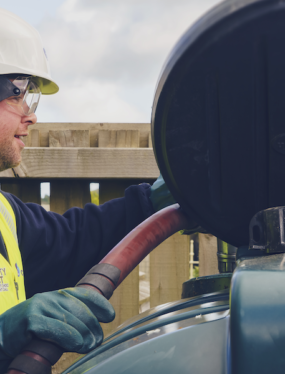The 2019 Climate Change Act amendments made Britain the first country to legally mandate ‘net zero’ emissions by 2050.
The journey to net zero carbon operations involves a transition, with avoid-reduce-offset each playing a role. Scottish Fuels are also empowering our customers to join in.
Scotland, along with the rest of the UK, continues to be the world leader in sustainable energy sources. These include but are not limited to:
Low emission technology
Cleaner liquid fuels, such as Glowmax kerosene heating oil
British legislation has also taken this movement further. Policy changes now mean that tax rebates for off-road red diesel are limited, encouraging us to think twice about our carbon emissions.
What liquid fuels and lubricants are currently available?
New legislation on diesel puts pressure on Scottish businesses to consider alternative options. For example, rather than simply switching to white diesel (DERV), choosing a different fuel altogether.
Of course, this is no easy task. To change to a different type of fuel means we have to make sure operational infrastructure is compatible and viable. We also need to consider long-term cost efficiencies, so there may be some trial and error before the ultimate goal is reached.
In the short term, however, we can swap to drop-in alternative fuels, which provide an agile energy mix:
- Gas-to-Liquid (GTL)
GTL fuel is a cleaner alternative to standard diesel with no implementation impact – something that more than half of businesses say deters them from making the change. GTL can be used without the need to modify vehicles or engines, and there is no additional infrastructure required.
This in turn helps to reduce harmful local emissions of nitrogen oxide and particulate matter – helping businesses to make the change, from construction to leisure, utilities, logistics, public sector and more.
- Therma35 industrial heating oil
Therma35 is a drop-in gas oil alternative. Like GTL, it does not need any equipment modifications and is used for heating appliances, including boilers, heaters, driers and furnaces. Therma35 is more energy-efficient than standard kerosene and therefore not only reduces emissions, but costs too.
This fuel burns more slowly than red diesel or kerosene heating oil, as well as bing a long-term storage option.
- Hydrotreated vegetable oil (HVO)
This biofuel is known as a ‘third generation’ product, which means it uses recycling waste and converts it into fuel. Sustainable sources such as cooking oil and used animal fats can be used to create renewable fuel, with a much smaller environmental impact.
HVO is still a relatively new product in the market, however there is incredible growth potential as we seek new ways to reuse the resources we have.
How can I increase fuel efficiency in my business?
If you’re not ready to make the switch to alternative fuels yet, or you are looking for additional ways to support the environmental agenda, try these:
- Learn more about fuel additives
While certain fuels can help with carbon emissions, fuel additives take this one step further. Using AdBlue allows fuel to pass through the Selective Catalytic Reduction system in a diesel engine. This converts nitrogen oxide into water vapour, helping to meet Euro V and VI emission standards.
- Look into remote fuel monitoring
Also known as telemetry, a remote fuel monitor will help you to see exactly how much fuel is being used and is available. A Smart Monitor can manage fuel use across large sites, and can also alert you via an app if there is any unusual activity. Prevent over-ordering and waste with a simple app.
- Try high-speed refuelling
If you want an alternative to bulk deliveries, try an HGV refuelling site. Our sites offer high-speed pumps to deliver up to 120 litres of fuel per minute, enabling multiple vehicles to refuel at the same time with a range of fuels available, including:
DERV
Red diesel
AdBlue
GTL
This saves time and money, which can be reinvested into sustainable options.
Ready to reduce your emissions? Call Scottish Fuels for more tips today.










